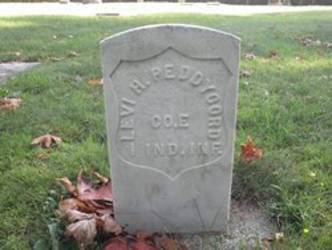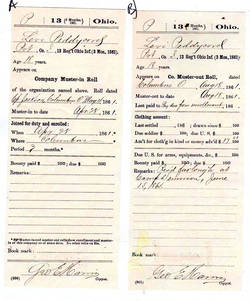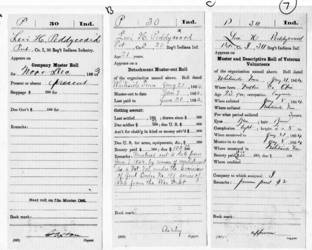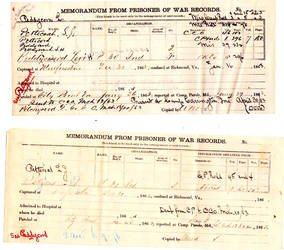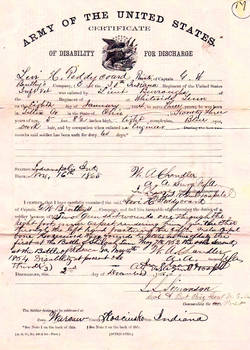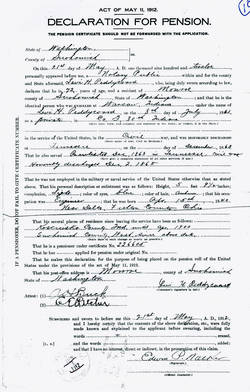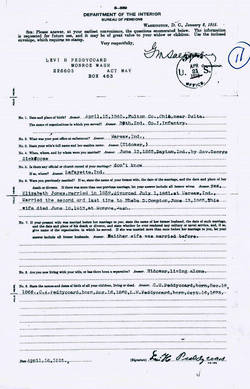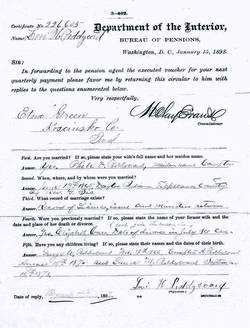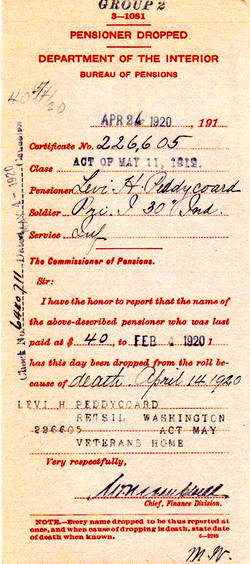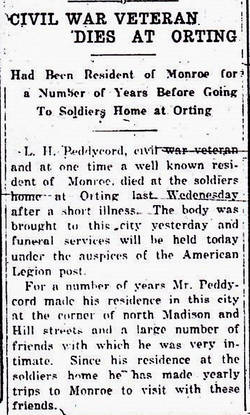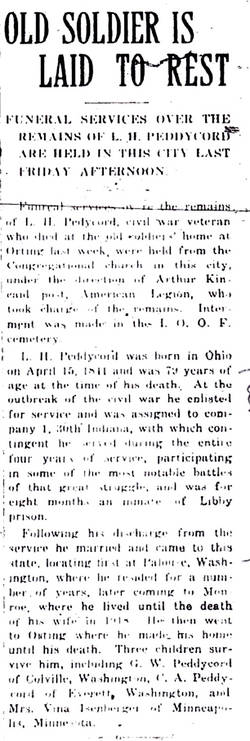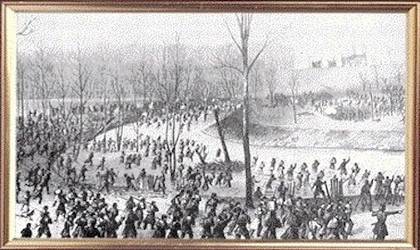Levi H. Peddycord
Representing: Union
G.A.R Post
- Lucius Day Post #123 Monroe, Snohomish Co. WA
Unit History
- 13th Ohio Infantry I
- 30th Indiana Infantry I & F & E
Full Unit History
13th OHIO VOLUNTEER INFANTRY
Organized: 4/20-27/61
Mustered In: 4/24-5/4/61 Camp Jackson, Columbus, OH
Mustered Out: 8/14-25/61 Columbus, OH
30th INDIANA VOLUNTEER INFANTRY
Organized: Summer, 1861 Ft. Wayne, IN
Mustered In: 9/24/61
Mustered Out: 11/25/65 SOLDIER: (13th)
Regimental History
REGIMENTAL HISTORY: (13th)
* Note: One database source pertaining to Levi's service in this regiment presents his surname as Peddycoart, while company rosters reflect Peddycord. The 13th Ohio was initially formulated as a three month regiment. Shortly thereafter it was reorganized as a three year unit. As a three month organization it was never given an assignment. Original enlistees who chose not to reenlist in the three year unit were mustered out with their companies having not left the state.
REGIMENTAL HISTORY: (30th)
* Note: One database source pertaining to Levi's service in this regiment presents Levi's surname as Peddycord, while company rosters reflect not only that spelling, but also Pettycord, Peddycoard, Peddycaard, Pettycoord, Pedicord, Petticord, Peddacord, Pedycoard and Peddycoard. The 30th Indiana, a three year western theater regiment left the state immediately after federal muster and moved to Camp Nevin in southern Hardin Co., KY. It then moved to Munfordville and Bowling Green before, in March, 1862, travelling to Nashville, TN. On 4/7/62 it lost heavily in the second day's fighting at Shiloh/Pittsburg Landing.
The regiment was next involved in the siege of Corinth, MS and after the fall of that city marched through Alabama and Tennessee to Kentucky in pursuit of Confed. Gen. Braxton Bragg's fleeing Confederate forces. Returning then to Nashville it moved toward Murfreesboro taking part in the battle of Stone's River at the end of the year. At Stone's River the 30th again lost heavily. It was actively engaged in the campaign that followed and again received severe punishment at Chickamauga September 18-20, 1863. As 1863 came toward a close the unit moved to Whiteside and Tyler's Station, TN where, in December, a small number reenlisted. These troops were re-mustered as veteran volunteers at Blue Springs in January, 1864 and furloughed home. The unit remained at Blue Springs until April when it moved eastward in the Atlanta campaign, participating in nearly all the battles and skirmishes of that movement.
At Atlanta the non-veterans were mustered out while the veterans and new recruits were consolidated into a battalion of seven companies which moved into east Tennessee before returning to Nashville and participating in the battle there with Confederate forces in December 15-16, 1864. The unit then marched into east Tennessee before, again, returning to Nashville where it remained until June, 1865 when it was sent to Texas as occupation forces. One company from the 36th Indiana joined the 30th during this period, being designated company "H." The battalion remained in Texas until being mustered out in late 1865.
Soldier History
SOLDIER (13th)
Residence: Warsaw, Kosciusko Co., OH Age: 21.0 yrs.
Enlisted/Enrolled: 4/28/61 Columbus, OH Rank: Pvt./Musician
Mustered In: 5/4/61 to date 4/28/61
Mustered Out: 8/18/61 Columbus, OH
Highest Rank: Pvt./Musician
SOLDIER: (30th)
Residence: Warsaw, Kosciusko Co., OH Age: 21.6 yrs.
Enlisted/Enrolled: 9/24/61 Ft. Wayne, IN Rank: Pvt.
Mustered In: 9/24/61
Mustered Out: 10/17/65
Highest Rank: Pvt.
Family History
PERSONAL/FAMILY HISTORY:
Levi H. Peddycord was reportedly born 4/15/40 in Fulton County, Ohio near the community of Delta. That same year the U.S. Census chronicling the York Township region of Lucas County, Ohio registered the family of John Peddycoard - the surname would receive many interpretative spellings throughout the years - with the household consisting of three males under five years of age, l male between the 30 and 40 years of age (John), one female between 30 and 40 (his wife) and one female between the age of 60 and 60 (likely the mother of John or his wife). The 1850 census was more specific: John Petichard (b.1811 OH) farmer, Elizabeth (b. 1813 OH), Mary (b. 1832 OH), Nathen (b. 1836 OH), Thomas (b. 1839 OH), Levi (b. 1840 OH), Elizabeth (b. 1844 OH), William (b. 1845 OH), John (B. 1846 OH) and Anna (b. 1850 OH). 1860 found the family in Harrison Township, Kosciusko County, IN and added one additional name to the seven children listed above: Buzal (b. 1853 OH). If there were additional children their names and years of birth are not available. Beyond his birth, the first firmly documented information on Levi is from April, 1861 when he enlisted in the U.S. Army for three months. However, apparently prior to this time, he had married. All that is known of the union is that his wife's maiden name was Elizabeth Jones and the couple divorced in Canada in July, 1861.
Turning to data collected by the army regarding Levi, he was noted as being 5' 9 1/2" tall, having a light complex, blue, eyes and auburn hair. Interestingly, he was said to be only 18 years of age. Occupationally, he was listed as being an "engineer", but exactly what type of engineer - railroad or construction, etc. - was not specified. The only incidents of note regarding Levi's enlistment with the 13th Ohio were that as early as June 15th he received a furlough. Likely this was to deal with his divorce. Further, when the regiment was reorganized for three years Levi apparently saw or learned something he didn't like because he chose to be discharged rather than to continue with the 13th. In all, Levi's stint with the unit, like the three month 13th itself, (and maybe even Levi's marriage) was a non-starter.
Just over one month after departing the 13th Levi re-enlisted, this time travelling to Indiana to join up with the 30th Indiana infantry. Why he left Ohio to join an Indiana regiment is not documented. Upon enlistment he was assigned to company "I". By year's end, for whatever reason, he had transferred to company "F" The enlistment in the 30th and the affiliation with company "F" would last until the war was ending and regiments and companies were being reorganized and consolidated.
Private Peddycord's tenure with the 30th was to prove more hazardous to his health than that with the 13th. Although available documents are incomplete, there are indications that Levi's baptism of fire was at Shiloh/Pittsburg Landing, TN. During that action of 5/7 he received a gunshot wound through the left hand which fractured the fifth metacarpal bone. As a result, the following month, and apparently into June, he was listed as hospitalized at Florence, AL In late December, 1862 Levi's regiment saw additional action at Stone River, GA. During that battle he not only received a rifle ball wound to the left thin, but apparently a flesh wound to the right hand. Also, he captured and held by the enemy and imprisoned for a number of months before being exchanged. After leaving prison he was in and out of hospitals for additional months.
In January, 1864 at Whiteside, TN Levi, re-enlisted as a veteran volunteer soldier. Upon re-enlistment he received a monetary bonus of between $100 and $400 (to be paid in increments) and, likely, a furlough home. Available records, however, do not reflect the furlough.
During fighting on May 14, 1864 at Resaca, GA as Union Gen. W.T. Sherman's forces advanced upon Atlanta GA, Levi received another gunshot wound, this time to the inner portion of his left foot. Because of this wound he would be in and out of hospitals for the remainder of the war, not rejoining his unit until discharged because of lameness which rendered him unfit to perform the duties of a soldier.
Fall, 1864 found Union forces being reorganized and consolidated. Consolidation was the creation of larger companies or regiments by combining two that, through attrition, had become too small to be field-effective. Involved in one such consolidation, Levi, although still hospitalized, found himself still in the 30th, but now in a new company designated as "E". How he learned of the transformation is not known as he was on hospital furlough as 1864 came to a close.
1865. The first half of this year appears to have found Levi moving in and out of various hospitals as well as being furloughed home, all because of his foot wound. Two things of significance occurred in Levi's life during this period. Firstly, on 6/6 he received his furlough. Secondly, on June 13th, during that leave in Dayton, Tippecanoe Co., IN he remarried to Phebe D. Compton (b. ca. 1839 IN).The union would produce three children and last until Phebe's death in June of 1913. More on this later. Secondly, as of 7/1/65, Levi's name appeared on a listing of soldier's having deserted while in the hospital. The charge, being erroneous, was dropped shortly thereafter.
Army life behind him, Levi and his new wife apparently settled in Warsaw, OH for a time before moving to Alwood, IN. According to Levi, they remained in Alwood for about one year during which he attempted farming "as best he could" considering the lingering effects of his war wounds. The couple then removed to Missouri where they remained for six months, Levi being able to work only 27 days of that period to the lingering effects of his war wounds. Departing Missouri, the Peddycords returned to Indiana where Levi "worked at whatever" before entering the practice of medicine at a location approximately six miles north of Alwood. The practice lasted only a short time as piles (hemorrhoids) forced Levi to quit and move back to Alwood. Once again he was forced take on what little work he could. In all, he would later indicate that throughout this period his medical problems, including chronic diarrhea, were getting worse. While different documents list differing dates, it appears most likely that on 12/18/66 Levi's and Phebe's first child George Willard was born. The couple would produce two additional children: Compton Arthur (b. 8/15/70) and Laura/Lavina M. (b. 9/16/73). All three would grow to adulthood and be living as of 1910.
The census of 1870 found Levi, Phebe and son Willard in Indiana residing in Plain Township, Kosciusko, County. Ten years later they were still in Kosciusko County, but then residing in Prairie Township with Levi supporting his family as a day laborer. By 1886 his income was being supplemented by at least a meager $6-$8 per month government invalid pension which may have been preceded by a lump sum payment tracing back to his date of military discharge.
As no U.S. census data exists for 1890, it is difficult to say where Levi and family were residing. However, in 1898 they were apparently still in Kosciusko County, residing in the community of Etna Green. Indications are, however, that shortly thereafter they moved from Indiana to Washington State settling first in Palouse, in the far eastern portion of the state and, by 1900, the community of Monroe in the western portion. The move westward may have been prompted by a desire to be close to adult children residing there.
By 1902 Levi's inability to support he and his wife for the previous two years by his personal labors and his government pension lead to a U.S. Senator from Washington State, Addison G. Foster (R. 1899 - 1905), introducing senate bill S252 in an effort to increase Levi's pension from $8 to $30 per month. Levi apparently testified before the U.S. Senate Commission on Pensions L as follows: (Note - some dates and locations do not coincide with previously cited military records): "I most respectfully petition and set forth for your consideration the following facts: I enlisted on 7/8/61 at Warsaw, Indiana in company I, 30th Indiana infantry...I was discharged 12/2/65 at Indianapolis having served four years and five months. I was wounded in the battle of Shiloh (4/7/62) and also shot in the foot at the battle of Corinth (MS), but for neither of these wounds did I go to the hospital although they were very painful. After hard marches and severe exposure I was taken to the hospital at Tuscumbia (Alabama) suffering from dropsy and chronic diarrhea caused by exposure and lack of proper food. After leaving the hospital I joined my company in Stevenson, Alabama. I was there for five or six weeks at which time I rested up and we were then ordered to follow (Confed.) Gen. (Braxton) Bragg back to Louisville (KY). On this entire march we were fighting each (day) and watching at night. At the battle of Murfreesboro (7/13/62) I was struck between the shoulders (while my company retreated from a position we had taken) by a piece of shell with such force that blood came from (my) ears, nose and mouth and caused me to temporarily lose consciousness and I was taken prisoner, but being so badly injured that I could not walk the rebels put me on a horse and allowed me to ride about a mile and then compelled me to dismount and walk although suffering terrible pain. I was taken to Richmond (VA) and placed in Libby prison on 1/18/63 and was there until 6/22/63 on which date I, with others, was exchanged. To show you that the treatment we received at this horrible place was killing on us, I will say that a few days before I was captured I weighed 189 pounds and a few days after being exchanged I weighed 90 pounds, losing nearly 100 pounds...at this prison I contracted scurvy in the worst form, caused by improper food and I have been a great sufferer from it ever since. The treatment we received in this place was beyond description. After spending about six months there it put me in such shape that I have felt its effects all through life. After being exchanged I rejoined my regiment in September, 1863 and in the battle near Tullahoma, Tennessee was shot in the left knee and sent to the hospital. After again leaving the hospital I again joined my regiment and was wounded in the left leg and was in the field hospital for about 12 days. At the battle of Resaca (GA 5/13-15/64) in the Atlanta campaign, I was shot through the left hand. I was sent to the hospital at Nashville and was there about three weeks. This wound has bothered me more or less ever since and has caused me many times to be unable to do any work for the support of my family. Ever since my discharge from the army, I have been a great sufferer from the wounds received and from the diseases contracted while in the army, namely, chronic diarrhea, scurvy and heart and stomach trouble. These have made life miserable for me and for days and days I have been unable to do any kind of work on account of the misery. At (the present time and for years I have been unable to do any kind of labor to speak of and have no means of support for myself and family except the small pension I now receive and with what little help my children can give me. Summary: (I) enlisted at age 21 (and) gave the best part of my life for my government. (I) haven't had a well day since. Please pass the bill and increase my pension." The fate of bill S252 is not known.
1910. Levi and Phebe were still in Monroe where Levi apparently worked for a paint store. Three years later, on 6/10/13 Phebe died and was buried in the Monroe I.0.0.F. Cemetery.
Levi died on 4/14/20, one day shy of his 80th birthday. At passing he was a resident of the Washington's Veterans Home located at Retsil, Kitsap County, WA. How long he had resided there is not known, but following his death the Monroe newspaper printed that each year he had travelled back to Monroe to visit friends. He was buried beside Phebe in the I.0.0.F. Cemetery.
Cemetery
Buried at IOOF Cemetery in Monroe
Row: Old Grave
Site: E06
Adopt-a-Vet Sponsor
Karyn Zielasko
Snohomish, WA
